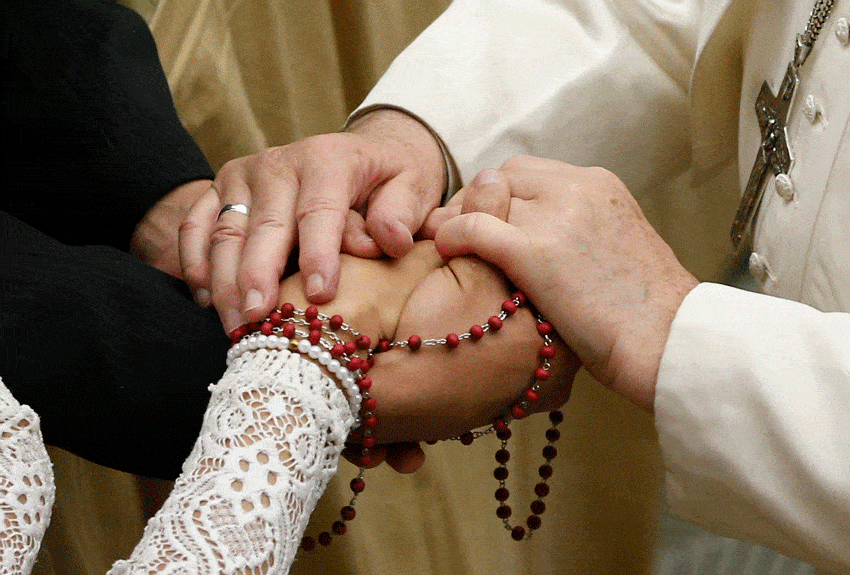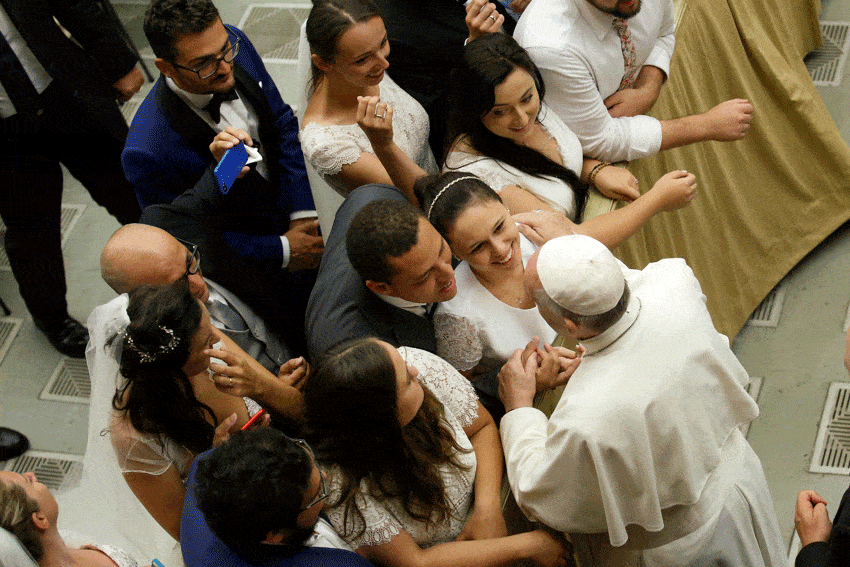
The Vatican has released a new document, ‘Catechumenal Itineraries for Married Life’, which outlines suggestions for meaningful and lengthy marriage preparation and support.
It’s the “lengthy” part of it that’s getting the most attention. According to a report in Catholicnews.com, the “marriage catechumenate” for couples should last about a year (and should come after kids and teens have been learning for several years about the meaning of marriage, long before they actually become engaged to one person).
A year! It sounds crazy, like an impossibly long time, until you consider that couples routinely spend a year or more planning the wedding and reception part of the day, reserving the hall, hiring caterers and a photographer, and so on. But the marriage part, the part that’s supposed to last a lifetime, often gets a few cursory workshop days, and then you’re supposed to be good to go.
As divorce and annulment and never-getting-around-to-it statistics show, couples are, in fact, very often not good to go. Marriage in the year 2022 is a mess. So if a year of preparation comes across as something of a gatekeeping effort, that might not be a bad thing.
While the Holy Father did take some steps to streamline the process for getting a decree of nullity — getting out of a relationship that was never valid to begin with — it’s hard to argue with the need for doing some hard work on the other end, and trying to help couples avoid getting into that situation in the first place.
When I interviewed canon lawyers who adjudicated countless annulment cases, they agreed that far too many people find themselves at the altar with no understanding of what marriage is or what the Church means by it.
They have never even thought to inquire what is expected of them, and no one has challenged them to ask the person they plan to marry if they even agree on the most basic questions. Their marriage was never valid because they had no idea what marriage was. So it was almost inevitable that the relationship fell apart, once one or both parties started to realise how vast the divide between them really was, and had been all along.

At the same time, the bar for a valid marriage is actually fairly low. You can have a valid marriage if you show up in the church with only the most basic idea of what you’re getting into, and only the most basic intentions of doing the right thing, and only the most basic capability of following through.
Marriage is a natural right, and a priest cannot (and should not) refuse to preside at a wedding just because he thinks the couple is not quite ready or even because they are a glaringly bad match. The Church gives couples an awful lot of freedom to enter into a binding union with the understanding that you both still have an awful lot to learn.
My own view is that no one can be truly prepared for marriage; one can only be ready. If there’s more help available to get ready, then that’s a good thing.
So while it’s true that a year-long preparation phase might be a deal-breaker for some couples, any requirement at all can come across as gatekeeping, depending on how it’s implemented and why the couple doesn’t want to wait.
Some couples are hell-bent on getting married on a boat, and that in itself is enough to make them decide they don’t need to get married in the Church. Others are more the smoldering wick types, and one can only hope that the pastor who meets them is wise enough to know not to snuff them out with requirements that would be cumbersome for them, because of where they are right now.
So there are really two issues, which I suspect is what this document is hoping to address: One is that many marriages are invalid because the couple doesn’t understand what marriage is, and doesn’t understand what is required of someone before they can enter into a valid marriage. More preparation can either help people rise to the occasion, or else alert them to the fact that they don’t want to commit to this thing after all.
The second issue is that validity is not enough to make a marriage successful.
Validity is just the bare minimum. It’s like getting a home inspector to say he can’t find any particular reason a house is likely to collapse, and it hasn’t been built in a flood zone by non-unionised chimpanzees. That doesn’t exactly guarantee the house will be a dream home, or even livable! It just means you have something to work with.
Well, it means more than that. Because the sacrament of marriage confers supernatural grace on those willing to receive it, validity means that the “house” of a valid marriage is something the Holy Spirit can work with — assuming the husband and wife are both willing to cooperate. And that’s really saying something!
So this is where the third phase of the ‘Catechumenal Itineraries’ comes in.
“The third phase of assisting newlyweds should last two or three years,” the report says. So it doesn’t just offer a lengthy preparation time, but it offers an even lengthier time of support.
This, too, is something I’ve heard canon lawyers put on their wish list: Some help for couples after the big day, when things start to get real. (I don’t really think two or three years is enough, but it’s a start!) Even valid marriages can founder, and even happy, well-matched couples can use guidance, support, encouragement, or a kick in the pants.
I’m not sure exactly what form the assistance might take, but the fact that someone is suggesting it’s necessary is a great step forward. People simply don’t have the family and community support they once did, and that’s doubly true if they’re the first generation in several generations to take Catholic marriage seriously.
So, we shall see. I never put much faith in programs, much less in documents that suggest how people ought to make programs. But I have to admit, what we’re doing now is not working. It just isn’t. So we’ll see! The worth of this program is something like marriage itself: The length of it is not really the important part. What matters is the quality, and much of that has to do with what individual people are willing to put into it.
Related:
